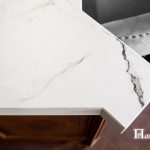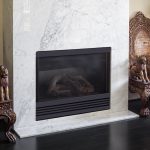Tips for choosing countertops for your kitchen or bath – Natural Stone vs Solid Surfaces”. Pavlina Papadopoulos of PavlinaStone Incorporated When it comes to your remodeling or new construction project, choosing the right material for each area of your home is of integral importance. There are several elements to consider when choosing between natural […]
The three basic geological types of stone are: Igneous Rocks (Granite) are mainly formed through molten magma. As the magma cools and condenses, it crystallizes forming the wide variety of colors and patterns. Metamorphic Rock (Marble) which is formed of calcium carbonate minerals. Over time, pressure and movement, it crystallizes forming the range of color, variety […]
UltraCompact Surfaces is a new world-wide, one of a kind, stone product manufactured by Cosentino. It is composed of a combination of natural quartzite, porcelain, glass and natural minerals. This product has zero maintenance and it has a 25 year warranty. Please call us so we can show you more.
Natural stone is a dynamic material, which exhibits tremendous variance of its core natural characteristics. The palette of colors and diversity of textures is extensive. Distinctive luster of the natural stone communicate elegance and quality that cannot be imitated by any other substance. The composition of natural stone is extremely complex on a chemical and […]
Like marble, granite is also a natural stone with many colors. However, the similarities stop here. Unlike marble, granite is composed of different materials with different properties. Granite is chiefly composed of 30% Quartz and 60% Feldspar. These minerals are much harder than the calcite of marbles and for this reason granite will not scratch […]
Marble is defined as any limestone that will take a polish. Limestones and therefore marbles are composed of minerals of calcite or dolomite. Colored marbles are the result of other minerals mixed with calcite or dolomite.Marble has many common characteristics. No matter what color, marble will usually have some type of veining running through it. […]
Is distinguished by its natural high quality sparkling appearances, and its shifting aesthetics as the light reflects from the variety of its mineral patterned surfaces. A variety of colors are available; very light white to silver, medium to dark grays, light to dark gold’s, soft greens to olive green, and a variety of blues. Quartz […]
Slate is commonly gray in color, although you may find green, yellow and red hues. It is a material from metamorphosed state. That is, it consists of clay like materials that have undergone change under heat and pressure. Slate can be recognized by its sheet-like structure. The material is usually thin, and if broken, will […]
Limestones are made of calcite from shells, coral and other debris. They are known as sedimentary rocks, because they are formed by the breakdown of other rocks, shells, etc. Limestones are usually loosely held together and may differ in porosity from marble. The course grain of some limestones give it excellent durability. Limestone can have […]
Travertine is a type of limestone but differs in that it formed in a hot springs called karst. The water movement in this karst erodes the travertine creating holes in the stone. Polished travertine will usually have these holes filled with colored cement. These fillers typically are not polished and will give the travertine a […]
- 1
- 2













